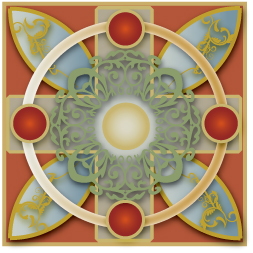Charalambos
Prochoros
Seleccionar idioma español/Choisissez la langue français

 This symbol indicates a definition.
indicates a definition. Hold your cursor over the symbol.
This symbol indicates a definition.
indicates a definition. Hold your cursor over the symbol.
Note that most links also have brief definitions. Hold your cursor over the link and wait a moment.
Haralambos
Haralambos was a presbyter  Synonymous
with priest. Its literal meaning in Greek (presbyteros) is "elder." in
the second century who lived in Magnesia in Asia
Minor. He preached openly (and into old age) in a time of the persecutions
of Emperor
Septimius Severus.
Synonymous
with priest. Its literal meaning in Greek (presbyteros) is "elder." in
the second century who lived in Magnesia in Asia
Minor. He preached openly (and into old age) in a time of the persecutions
of Emperor
Septimius Severus.
At the age of 113, he was arrested by Governor Lukianos, who attempted to force
Haralambos to renounce Christ. However, Haralambos healed the afflicted who were
brought to him and won converts, and he drove a demon out of a mad man who had
been possessed for 35 years. So, the people protested his proposed death and
the governor had to send Haralambos to the emperor, by whom he was condemned. But,
Haralambos converted the emperor's daughter, Gallina  Septimius Severus had no children, so the chronology of this traditional telling of Haralambos' life is a bit suspect..
Septimius Severus had no children, so the chronology of this traditional telling of Haralambos' life is a bit suspect..
Nevertheless he was condemned. Before he died, he prayed for the sins of all men and the abundance of the fruits of the earth, then gave up his soul before he could be beheaded. The executioners were converted, and Gallina buried his body.
(Life of St. Haralambos from St. Nicodemos of the Holy Mountain)
Charalambos
Charalambos lived during the reign of Emperor
Severus and governor Lucianus
in 198. He was a presbyter  Synonymous
with priest. Its literal meaning in Greek (presbyteros) is "elder." of
the Christians in the city of Magnesia and he used to teach the way to truth
and preach the faith in Christ. But he was condemned to be stripped of his
priestly garments and flayed alive. When governor Lucianus saw that Charalambos
was courageously suffering the torments, Lucianus got angry and tried to skin
him with Charalambos own hands. But Lucianus' hands were immediately cut off
and hung on the Charalambos' body.
Synonymous
with priest. Its literal meaning in Greek (presbyteros) is "elder." of
the Christians in the city of Magnesia and he used to teach the way to truth
and preach the faith in Christ. But he was condemned to be stripped of his
priestly garments and flayed alive. When governor Lucianus saw that Charalambos
was courageously suffering the torments, Lucianus got angry and tried to skin
him with Charalambos own hands. But Lucianus' hands were immediately cut off
and hung on the Charalambos' body.
Therefore, Charalambos prayed and restored Lucianus to health. When the torturers Porphyrios and Baptos saw this miracle, they denied the idols and believed in Christ. Likewise, three women, who were standing by watching the martyrdom, also believed.
Lucianus arrested them all and had them executed because, even though Charalambos had cured his body, Lucianus' soul remained incurable.
Prochoros
Prochoros was a monk towards the end of the eleventh century near Kiev.
Orach
 any of several plants, of the genus Atriplex, found in dry habitats, that have edible leaves resembling spinach.
was a spinach grown in the hills that he made into bread. With his blessings,
it was sweet; but, without his blessings it was not edible.
any of several plants, of the genus Atriplex, found in dry habitats, that have edible leaves resembling spinach.
was a spinach grown in the hills that he made into bread. With his blessings,
it was sweet; but, without his blessings it was not edible.
At a time when there was a shortage of salt in Russia, he blessed ashes and the ashes became salt. The prince once ordered that the ashes from the cell of Prochoros be brought to him, but the ashes remained ashes. Prochoros told the people to take the ashes from where the prince had discarded them, and they would become salt, and it happened in this way. This act converted the prince, who later buried Prochoros himself.
Glory be to God forever, Amen.
Almighty God, you have surrounded us with a great cloud of witnesses: Grant that
we, encouraged by the good example of your servants Haralambos, Charalambos,
and Prochoros may persevere in running the race that is set before us, until
at last we may with them attain to your eternal joy; through Jesus Christ,
the pioneer and perfecter of our faith, who lives and reigns with you and
the Holy Spirit, one God, for ever and ever. Amen.